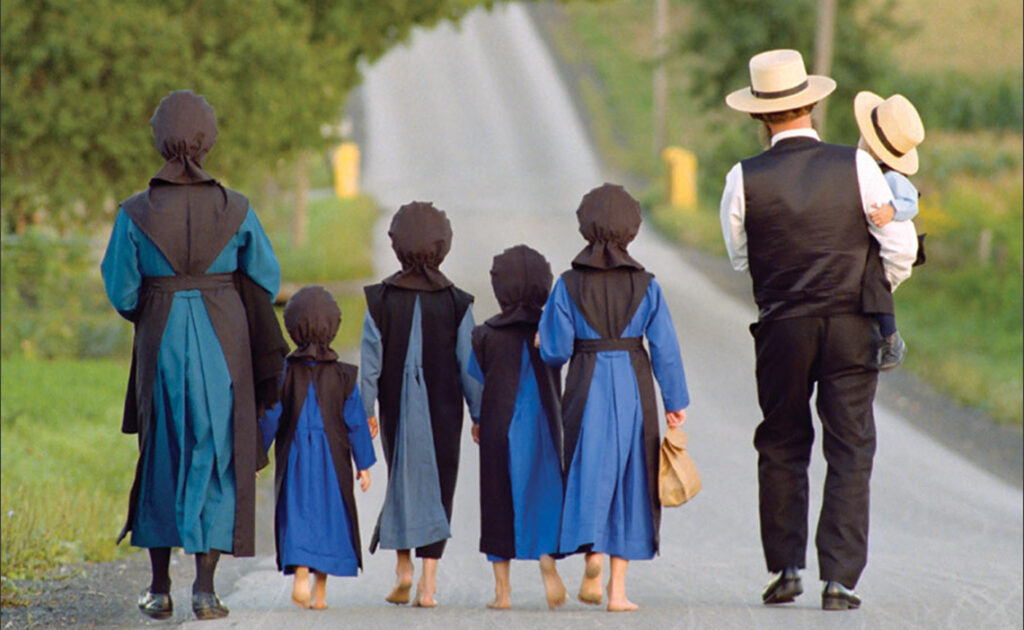Blog Post
What we can learn from the Amish
By Jonathon Van Maren
Living in Amish country, it is normal to see big, beautiful horses pulling black buggies down the road, barefooted children in bonnets and overalls carrying their lunch pails to school, and adults working in the fields with plows, wagons, and threshers. Just up the road from my place is an Amish schoolhouse from the 1800s; the playground is still packed most days around noon. Our Tim Horton’s is probably the only one in the country with a hitching post.
Having the Amish as neighbors means I’ve had the chance to watch them at work, and I’ve wandered around their farms with their white frame houses, stables, and scores of small outbuildings. An Amish carpenter built my chicken coop; I bought my bob white quail from an Amish farmer. Watching the threshers at work is like stepping back in time, and the synchronicity with which the men operate in the fields and on the wagons as they bring in the harvest is a lost art.
It is easy to idealize the Amish lifestyle from a distance, observing the lush gardens, the pastures of sheep (especially around lambing time), and the magnificent draft horses. But it is a hard life, too. I’ve met Amish farmers I thought were over sixty only to discover that they were well over a decade younger. As Kristin Kimball humorously concludes in her 2010 memoir The Dirty Life: On Farming, Food, and Love, most people who dream of the farming “trad life” should probably just have a garden—a small garden.
But I’ve often wondered how the Amish set—and maintain—their standards. Why, for example, can they have some engine-operated equipment, as long as it is pulled by horses? Where is the consistency there? I found the answer in a fascinating 1975 documentary The Amish: A People of Preservation.
Essentially, the Amish decided what sort of lives they wished to live, and they placed tools and technology within that context. They wish to maintain the pace of life that their communities have lived for centuries, and thus new technologies must be adapted to their lifestyle rather than the other way around. The consistency is not about the engine per se. It is about refusing to allow tools and technology to disrupt the type of life the Amish prize for both religious and traditional reasons.
The Amish use tools, but they do not allow their technology to take the reins. In the modern world, our lives revolve in large part around the pace and the demands set by our technology and our machines and the promise of never-ending growth, from the emails and ads sent incessantly to our smartphones to the ever-expanding capacity of industries churning out cheap junk to feed the consumer maw. The modern principle is simple: If we can, we should. It is not an economy oriented around humans, and most metrics indicate that materialism is making us miserable.
My intention here is not to make an economic critique, but a personal application. An anecdote in the 2004 memoir House Calls and Hitching Posts: Stories from Dr. Elton Lehman’s Career among the Amish sums it up well. He recounts how an Amish historian was once giving a lecture to a room full of academics on how the Amish live. To illustrate the Amish mindset, he asked his audience how many of them felt they watched too much TV and thought their lives would be better off without it. Nearly every hand in the room went up. Having admitted this, the historian went on, how many of you will go home and get rid of your TV? And every hand in the room went down.
That, the historian explained, is where the Amish differ from the rest of society: they have decided to reject those things that will interrupt or inhibit the sort of lives they wish to live, while most of us remain voluntary slaves to things we know we would be better off without.
How many of us have complained about the extent to which our smartphones and other technologies dominate our lives? I certainly have. Our conveniences now often control us, just as the neuroscientists and corporate bosses working on the algorithms intended. We consume the news, and the news consumes us, especially during the pandemic—and it shapes our worldviews in ways previously unimaginable, giving us literally more information than the human brain is designed to handle. We get angry at people we love and care about on platforms promoted as places to connect.
Getting email on the smartphone is handy, because we can answer people from anywhere; it now turns out that work can reach us at all times, too—and most of us will feel compelled to answer right away, because our minds have been trained by our devices rather than the other way around. We are all on call, all the time. We know that we waste too much time on social media and that it generally leaves us dissatisfied, upset, envious, or worse—but we click on the apps over and over again anyway, like crackheads looking for a fix.
We wonder why we read less, are more irritated by people, why time seems to vanish into the screen so rapidly, and we ignore the obvious answer staring us right in the face because we don’t want to change our lives—because we are addicts. For me, the crack is the news cycle, which now unfolds in real time on Twitter with a million takes a minute. For you, maybe it is Instagram, or TikTok, or YouTube rabbit holes that end with you watching videos of sustainable farming practices in Iceland at 3:30 AM. Almost everyone I talk to will admit that their devices now consume a previously unimaginable portion of their lives. And yet we all stay on the tech treadmill, doom-scrolling to the next post that will make us feel slightly more helpless and our lives slightly worse.
Maybe you are one of the rare ones who has strict controls on technology, doesn’t waste time online, and feels that your devices have contributed only to your happiness. In that case, this doesn’t apply to you. It does, however, apply to most of us, especially over the last year and a half.
This is where I think we can learn something from the Amish. Not from their farming practices or their architecture, and certainly not from their schooling (they dismiss most non-practical subjects as superfluous), but from their philosophy. Perhaps we could look at our technology and ask ourselves with brutal honesty: Does this contribute or detract from the kind of life that I want to live? Or perhaps more importantly: Does this help or hinder the sort of life I should live? And if it does not, why am I allowing it to influence and shape my life for the worse?
For most of us, getting rid of our devices entirely is unrealistic—although I know an increasing number of people opting for a dumb phone simply to cut out the noise. But we can delete the social media apps off our smartphones, confining those platforms to our laptops or computers. We can commit to staying away from social media for most of the day, recognizing that those around us are more important and that we like most of the people on social media a lot more in person, anyway. We can stop headline grazing and packing our skulls filled with context-free information, conspiracies, and up-to-the-minute news that gives us the illusion of control but simply makes us miserable. And when we do that, we can spend our time doing the things that we say we actually want to be doing.
I’m a political junkie, and there’s a reason that phrase has the word “junkie” in it. But the pandemic has also made me realize that being constantly connected and plugged in to both people and politics has made me like people less (and I’m sure vice versa), ruined my mood, and made me irritable and ungrateful when I’ve been given so many blessings. When I put down my phone and shut my laptop, my life outside the boundaries of those screens is pretty wonderful. I’ve got a beautiful family, lots of books, plenty to eat, feathered and furry pets, and a huge tree in my front yard turning gold in the October air. So I’ve deleted all of the social media apps from my phone, largely checked out of COVID debates online, and am striving to keep my news consumption to the work day when I have to write commentary.
Our devices are supposed to be conveniences, not portals consuming our lives. One observer recently noted that only with drugs and social media are the customers called “users,” and that is no Freudian slip. Perhaps some of us can take a page out of the Amish book, decide what sort of lives we want to live, and then get rid of those things preventing us from doing so. I suspect most of us would be happier if we did.
***








